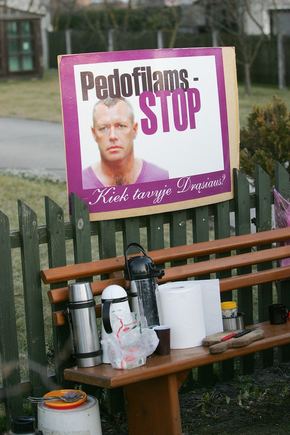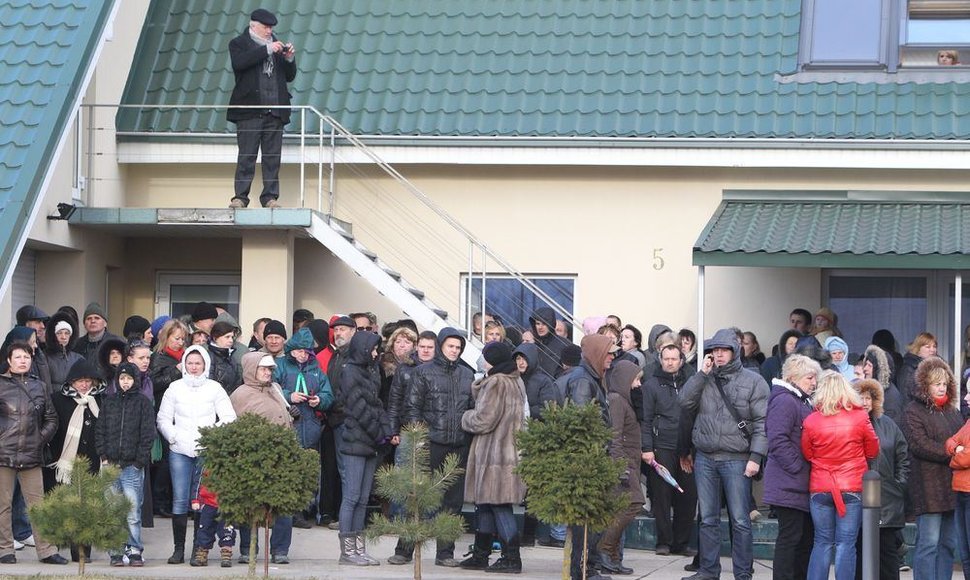The vigil is caused by the events of 23 March. On that day, a court decision stating that the daughter of the deceased Drąsius Kedys should live with her mother, Laimutė Stankūnaitė, was prevented from implementation due to decisive actions by Kedys’ mother and Kedys’ father who did not allow state officials to take their granddaughter from the house.
On 23 March, some physical fighting over the girl took place. Venckienė, who is the sister of the deceased Kedys, said that videos of the fighting show that the state-imposed guards, wearing masks, and Stankūnaitė tried to take the girl by force. One of Stankūnaitė’s guards even pushed Kedys mother to the floor. The fighting ceased after an employee of the state children’s rights service started to scream, urging for a halt to the violence. Stankūnaitė, Kedys’ ex-girlfriend, showed up with a black eye in a TV studio the next day and said that Kedys’ 74-year-old father hit her during the incident. However, pro-Kedys camp sympathizers point out that TV footage shows Stankūnaitė leaving the house in Garliava with no signs of injuries on her face.
Kedys’ daughter remains under the custody of Venckienė. The girl does not leave the house and studies at home due to fears that the state officials can easily grab her if she would leave the fenced territory of Venckienė’s private house.
“Regardless of the court’s decision in favor of the mother, I would suggest to the mother to leave the girl under the [current] custody. After some 20 years, the girl will come to the mother to thank her for such a decision,” Parliament Speaker Irena Degutienė said during her briefing on March 28.
“According to recommendations from prominent psychologists, the best solution would be to allow the girl to live for some time in a psychologically neutral environment,” Prime Minister Andrius Kubilius said during his press conference on 28 March.
Stankunaitė appealed to the European Court of Human Rights in Strasbourg demanding the Lithuanian state to pay her 100,000 euros as moral compensation due to its failure to implement the Lithuanian court’s decision regarding the return of the girl to her.
Elvyra Baltutytė, the representative of the Lithuanian government in the European Court of Human Rights in Strasbourg, said that the Strasbourg court usually takes the side of parents and Stankūnaitė has a good chance of winning in Strasbourg. “I don’t think that the European Court of Human Rights will understand all the passions which are boiling in Lithuania,” Baltutytė said at her press conference on 28 March. She urged Lithuanian politicians to avoid making statements on the case because the European Court of Human Rights can take it as intolerable pressure on the courts. Back in January, Lithuanian President Dalia Grybauskaitė said that “Venckienė is implementing the court’s decision.”
On 29 March, a group of MPs wanted to initiate a discussion on Kedys’ daughter in the parliament. “A lesbian clan has started to rule in Lithuania and this is why a discussion is needed,” Julius Veselka, MP of the Order and Justice Party’s parliamentary faction, said in the parliament, pointing to the statements by Degutienė and Grybauskaitė on the case. “We should leave the implementation of justice to the courts,” Social Democrat MP Juozas Olekas said, urging to avoid discussions on Kedys’ daughter. After this exchange of opinions, MPs voted against the public discussion in the parliament.
Saulius Stoma, MP of the parliamentary faction of the ruling Homeland Union – Lithuanian Christian Democrats, urged MPs to go to Garliava and to take part in a vigil there to prevent a repeat of the violence. Several MPs expressed support for this initiative.
On 30 March, members of the Council of Judges held a press conference to condemn the public statements by Venckienė, who said that people were forced to take justice into their own hands because the Lithuanian justice system was corrupt. “Does she believe in what she is doing?” Nerijus Meilutis, member of the council, asked rhetorically, pointing out that Venckienė is a judge herself. Earlier, the Council of Judges voted in favor of firing Venckienė from the judicial profession, but Grybauskaitė refused to satisfy the request.
During a phone-in voting that a Lithuanian TV channel TV3 held on 28 March, 31,000 viewers answered “no” to the question “Is it possible to return the girl [to her mother] before the final verdict in the paedophilia case?” while 789 viewers chose the answer “yes.”
On 5 October 2009, Kedys, 37, who said his young daughter (she is now eight years old) had been victim of paedophiles (including businessman Andrius Ūsas, who drowned in a shallow wetland in 2010), gunned down (as prosecutors officially suspect) Kaunas Judge Jonas Furmanavičius (who was suspected by Kedys of abusing his dauhter) and his former girlfriend’s sister (the aunt of his daughter). Earlier, Kedys had publicly accused both of them of being involved in the molestation. After the double murder in Kaunas, Kedys was at large. In 2010, he was found dead near Kaunas. Officials concluded that Kedys choked on vomit caused by alcohol abuse. The paedophilia case is pending in courts, regardless of the death of one of the suspects, Ūsas.
On 19 March, the political party The Way of Courage (“Drąsos Kelias” in Lithuanian – a pun on Kedys' firts name) was officially registered by the Lithuanian Justice Ministry. This political party is made up mostly of those people who take part in the vigil in Garliava. The party will take part in the parliamentary elections in October. The party’s leader is Catholic priest Jonas Varkala. The leadership of Lithuania’s Roman Catholic Church was not very happy about such political activism by Varkala. His work in the priesthood was suspended on the mutual wish of Varkala and the Church’s leadership.
 |
| BFL/Aliaus Koroliovo nuotr./Kedys image has become a political rallying point. The poster reads "Stop paedophiles" and "How much courage/Drąsiaus do you have inside?" |












